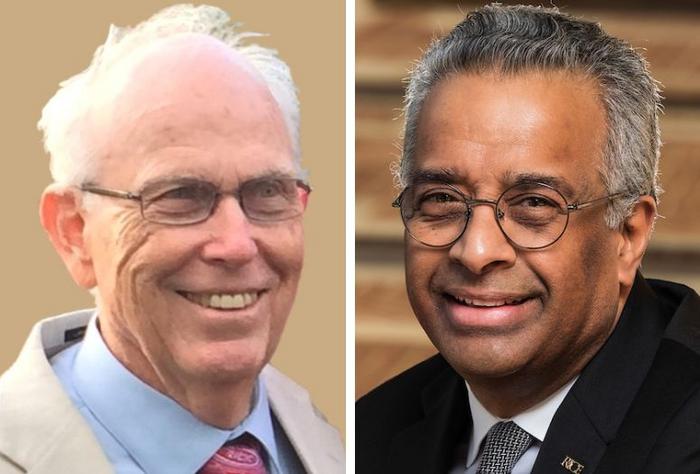HOUSTON – (May 2, 2024) – Rice University’s Ramamoorthy Ramesh and Frank Reese Harvey are among 120 new U.S. members elected to the National Academy of Sciences (NAS) “in recognition of their distinguished and continuing achievements in original research,” according to a statement from the organization.
Members are elected by their peers based on their contribution to one of six areas of scientific inquiry following an extensive vetting process. Established in 1863 through an act of Congress, NAS serves as a source of independent, objective advice on science and technology matters of national interest. Approximately 190 of the organization’s current 2,900 members (including 500 international members) have received Nobel prizes.

Credit: Photo courtesy of Frank Reese Harvey; Photo by Jeff Fitlow/Rice University
HOUSTON – (May 2, 2024) – Rice University’s Ramamoorthy Ramesh and Frank Reese Harvey are among 120 new U.S. members elected to the National Academy of Sciences (NAS) “in recognition of their distinguished and continuing achievements in original research,” according to a statement from the organization.
Members are elected by their peers based on their contribution to one of six areas of scientific inquiry following an extensive vetting process. Established in 1863 through an act of Congress, NAS serves as a source of independent, objective advice on science and technology matters of national interest. Approximately 190 of the organization’s current 2,900 members (including 500 international members) have received Nobel prizes.
Ramesh is Rice’s executive vice president for research and professor of materials science and nanoengineering and physics and astronomy. Previously, he served as the Purnendu Chatterjee Chair in Energy Technologies at the University of California, Berkeley, director of the Berkeley Nanoscience and Nanoengineering Institute, founding director of the U.S. Department of Energy SunShot Initiative, deputy director of science and technology at Oak Ridge National Laboratory and associate laboratory director at the Lawrence Berkeley National Laboratory. Ramesh’s research explores the unique properties, synthesis and design of multiferroic materials with discoveries stemming from this work serving as a springboard for potential logic-in-memory applications. Ramesh earned B.A. degrees from Madras University and the Indian Institute of Science, Bangalore, and an M.A. and Ph.D. from UC Berkeley.
“I am deeply honored by this recognition and would like to express my gratitude to the mentors, colleagues, students and most importantly the funding agencies who have supported me in my journey,” Ramesh said. “I’ve always been driven by the unparalleled feeling of excitement that comes with uncovering new knowledge, and I see it as part of my mission to help foster that feeling and help drive discovery, not just in my own field but for research in the broadest sense, across disciplines.”
“I’ve always aspired to the distinction of being recognized as a member of the National Academy of Sciences, so I am humbled and honored this has come to pass,” said Harvey, professor emeritus of mathematics who was Rice’s Edgar Odell Lovett Professor when he retired. “I really enjoyed sharing my love of mathematics during my years of teaching at Rice, especially since the students are so brilliant, and it has been rewarding to have some of them share that passion and go on to enjoy careers in mathematics as well. Upon retirement from Rice in 2003, my passion for mathematics has only increased.”
Harvey’s research focuses on analysis and geometry ⎯ specifically complex variables, partial differential equations, differential geometry and most recently nonlinear elliptic equations. He is a co-author on the 1982 work which introduced calibrated geometry and is one of the most widely cited papers in the field. After his retirement, Harvey continued to dedicate himself to research, increasing his previous publication amount by over 68%. Harvey joined Rice’s faculty in 1968 and holds a B.S. and M.A. from Carnegie Mellon University and a Ph.D. from Stanford University.
President Reginald DesRoches said “the election of Ramesh Ramamoorthy and F. Reese Harvey to the U.S. National Academy of Sciences marks a milestone in Rice University’s legacy of excellence in research and academic distinction.”
“It is a testament to their profound contributions to their respective fields and underscores Rice’s commitment to fostering groundbreaking scholarship,” DesRoches said. “As we celebrate this achievement, we also reaffirm our dedication to advancing knowledge and shaping the future through innovative research and academic leadership.”
Ramesh and Harvey’s induction brings the total number of NAS members among living Rice faculty to 11 and 17 overall.
“Ramesh and Harvey are brilliant thinkers and widely cited scholars who have made an immense impact on their fields and beyond,” said Amy Dittmar, the Howard R. Hughes Provost and executive vice president for academic affairs. “It’s an honor to have not one but two Rice faculty selected for this highly prestigious membership, which recognizes their excellence.”
Thomas Killian, dean of the Wiess School of Natural Sciences and a professor of physics and astronomy, highlighted Ramesh as “a remarkable and inspiring leader of the scientific enterprise, whose pathbreaking research on the synthesis and properties of advanced materials has had great impact on energy and information technologies.” Killian also underscored that “Harvey’s work on the properties of manifolds, and how to describe them, laid the foundation for a new field of math called ‘calibrated geometries,’ which illuminates fundamental connections between mathematical functions and geometric shapes.”
“Ramesh and Harvey are among Rice’s most distinguished scholars, and I am delighted they have received this honor,” Killian said.
Luay Nakhleh, the William and Stephanie Sick Dean of the George R. Brown School of Engineering, offered his congratulations to Ramesh, who holds primary appointments in both the school of natural sciences and the school of engineering, saying the distinction bears witness to “his remarkable career in academia, national labs and beyond.”
“His tireless efforts in advancing materials science and engineering is shaping the landscape of renewable energy and microelectronics research and development worldwide,” Nakhleh said.




